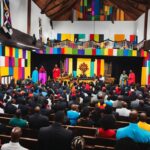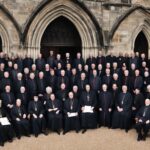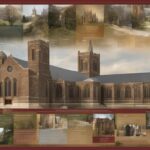Church leadership is a position of great responsibility and requires individuals with the necessary qualifications and competencies to guide and inspire their congregation. Effective leadership in the church is essential for spiritual growth, community engagement, and the overall well-being of the faith community. In this comprehensive guide, we will explore the essential qualities that church leaders should possess, providing insights into their history, beliefs, sacraments, and rituals, as well as the contemporary challenges they face. By understanding these aspects, church leaders can enhance their ability to make a positive impact and lead their congregation with wisdom and integrity.
Key Takeaways:
- Church leadership requires individuals with specific qualifications and competencies.
- Understanding the history and origins of church leadership provides valuable insights into its significance and development.
- Examining the beliefs and doctrines of different denominations and sects helps align leadership practices with core values.
- Sacraments and rituals play a significant role in church leadership, offering opportunities for spiritual guidance and growth.
- Church leadership encompasses various roles, including clergy members who hold specific positions of authority.
History and Origins of Church Leadership
Church leadership has a rich history that stretches back centuries, originating from biblical teachings and the early days of the Church. Understanding the roots and development of church leadership is integral to comprehending its significance in modern religiosity.
In the early Christian communities, leadership roles emerged naturally as individuals with strong faith and knowledge of scripture took on responsibilities such as teaching and spiritual guidance. These leaders, known as elders or overseers, played a crucial role in nurturing and sustaining the early Church.
As the Church grew and evolved, the structure of leadership became more defined. Inspired by the model set by the apostles, early Christian communities established hierarchical systems that included bishops, priests, and deacons. This structure allowed for organized governance and the preservation of doctrine.
The importance of church leadership was reinforced by the writings of early Church fathers such as Ignatius of Antioch, who emphasized the authority and divine appointment of bishops. These teachings laid the foundation for the hierarchical structure that remains prevalent in many Christian denominations today.
Throughout history, church leadership has played an essential role in shaping the beliefs and doctrines of Christian communities. The office of the pope, established in the Roman Catholic Church, represents the highest position of authority and symbolizes the unity of the Church. The Protestant Reformation brought about significant changes to church leadership, with the rejection of papal authority and the decentralization of power.
The history and origins of church leadership provide valuable insights into the development of different leadership structures, practices, and beliefs within Christianity. By examining the historical context, leaders can gain a deeper understanding of their roles and responsibilities in guiding their congregations.
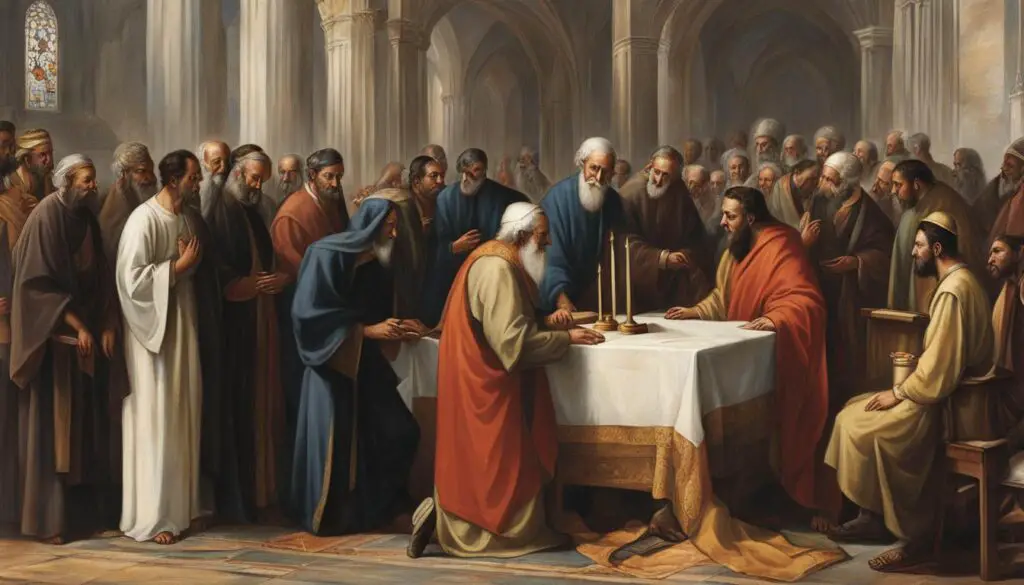
“The history and origins of church leadership provide valuable insights into the development of different leadership structures, practices, and beliefs within Christianity.”
Beliefs and Doctrines in Church Leadership
Church leadership is deeply influenced by the beliefs and doctrines upheld by different denominations and sects. The core values and principles that guide these religious institutions are crucial in shaping the leadership practices within them. Understanding and aligning with these beliefs and doctrines is essential for church leaders to effectively lead their congregations and fulfill their spiritual responsibilities.
“As leaders, we must embody the beliefs and doctrines of our faith, serving as beacons of light and inspiration for those entrusted to our care.”
Each denomination and sect within Christianity may have unique beliefs and doctrines that influence their approach to leadership. These beliefs encompass a wide range of theological and moral principles, providing a foundation for church leaders to navigate their roles with integrity and conviction.
For example, some denominations emphasize the authority of Scripture, viewing it as the ultimate guide for faith and practice. Church leaders in these traditions may place a strong emphasis on biblical teachings and strive to ensure that their leadership aligns with the teachings of the Bible.
On the other hand, certain denominations prioritize the role of tradition and the wisdom of historical church teachings. Church leaders within these traditions may incorporate rituals, liturgy, and centuries-old practices in their leadership styles, seeking to preserve the rich heritage of their faith.
Furthermore, beliefs and doctrines surrounding salvation, sacraments, the nature of God, and ethical teachings can also significantly influence how church leaders approach their roles. Understanding and interpreting these theological tenets helps shape a leader’s decision-making processes and their ability to guide their congregations based on their fidelity to their respective faith traditions.
Beliefs and Doctrines in Church Leadership
| Denomination/Sect | Main Beliefs | Doctrines |
|---|---|---|
| Protestant | Emphasis on Scripture, personal relationship with God | Sola scriptura, justification by faith alone |
| Catholic | Authority of Pope, sacraments, tradition | Papal infallibility, transubstantiation |
| Eastern Orthodox | Mystical experience, veneration of icons | Divine liturgy, theosis |
The above table provides a simple overview of the beliefs and doctrines within some major denominations. It is essential to note that this is not an exhaustive list, as there is a vast spectrum of beliefs and doctrines within the Christian faith.
By deeply understanding the beliefs and doctrines of their specific traditions, church leaders can effectively lead and shepherd their congregations in a manner that upholds the rich traditions and values of their faith.

Sacraments and Rituals in Church Leadership
Sacraments and rituals hold a pivotal role in church leadership, serving as powerful conduits for spiritual connection and transformation. As church leaders guide their congregations on their faith journeys, understanding the significance and purpose behind these sacred practices becomes paramount in fostering a vibrant and meaningful spiritual community.
Sacraments:
Sacraments are sacred ceremonies in the Christian tradition that symbolize and convey the grace of God. These rituals, often rooted in biblical teachings, are considered essential milestones in the spiritual lives of believers. Through sacraments, individuals connect with the divine, celebrate key aspects of their faith, and enter into a deeper relationship with God.
Common sacraments observed in various denominations include:
- Baptism: The sacrament of baptism signifies the initiation into the Christian faith, symbolizing purification, rebirth, and the welcoming of the Holy Spirit.
- Confirmation: Through confirmation, individuals affirm their faith and receive the Holy Spirit, strengthening their commitment to Christ and the Church.
- Eucharist (Holy Communion): In the Eucharistic sacrament, participants partake in the body and blood of Christ, commemorating His sacrifice and nurturing their spiritual communion with Him and fellow believers.
- Reconciliation (Confession): Reconciliation, also known as confession, provides a means of repentance and forgiveness, allowing individuals to reconcile with God and the community.
- Marriage: The sacrament of marriage is a sacred union between two individuals, rooted in the biblical concept of covenant, representing a lifelong commitment, and reflecting the love of Christ for His Church.
- Anointing of the Sick: This sacrament offers spiritual support and healing to those who are ill, uniting them with the compassionate presence of Christ.
- Holy Orders: Through this sacrament, individuals are ordained as deacons, priests, or bishops, receiving the grace and authority to serve and lead the Church.
Rituals:
Rituals in church leadership encompass a range of practices that hold symbolic, communal, and spiritual significance. These rituals help create sacred spaces and foster a sense of unity, reverence, and devotion within the faith community.
Common rituals observed in worship services and congregational gatherings include:
- Prayer: Prayer serves as a foundational ritual in church leadership, enabling direct communication with God, offering solace, guidance, and praise.
- Communal Worship: Gathering together in worship allows the congregation to collectively express their devotion, offer gratitude, and receive spiritual nourishment.
- Singing: Music and hymns have long been integral components of church rituals, uplifting hearts and minds, inviting worship, and promoting collective worship.
- Liturgy: Liturgical rituals, guided by prescribed order and structure, create a framework for worship, often including prayers, readings, and responsive congregational participation.
- Celebrations and Festivals: Special occasions such as Christmas, Easter, Pentecost, and other religious holidays provide opportunities for commemoration, rejoicing, and deeper reflection on the core tenets of faith.
- Sacred Symbols and Gestures: The use of symbols such as the cross, candles, water, and specific gestures like kneeling, bowing, and the sign of the cross, enriches the worship experience and fosters a deeper connection with the divine.
By embracing the sacraments and rituals unique to their traditions, church leaders can create transformative worship experiences, nurture spiritual growth, and cultivate a sense of belonging and sacred purpose within their congregations.
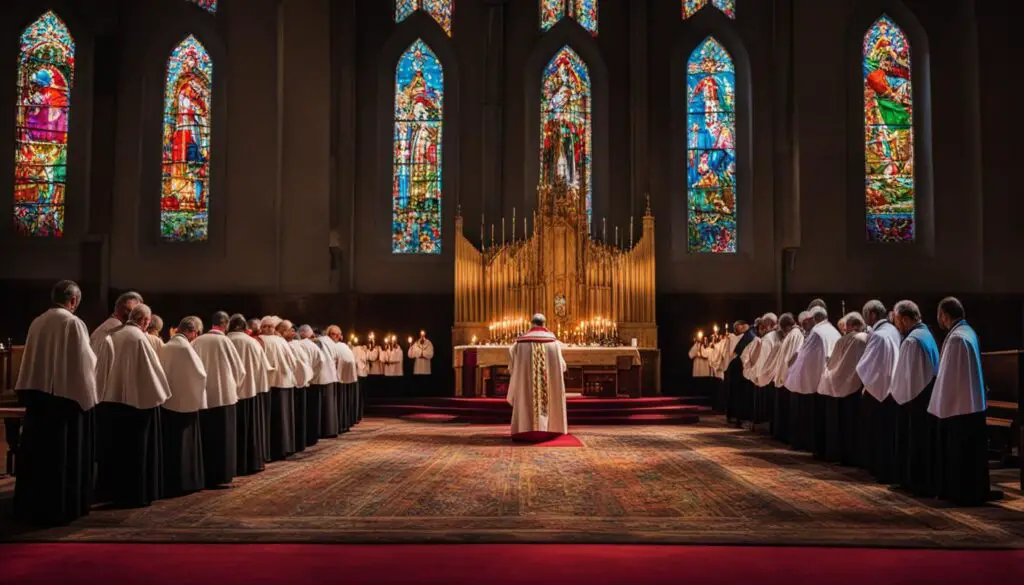
Leadership and Clergy Roles in the Church
Church leadership encompasses various roles, including clergy members who hold specific positions of authority within the church. These individuals play a crucial role in guiding and shepherding their congregations, providing spiritual leadership, and nurturing the faith of their community.
Within the church, there are different leadership roles that clergy members fulfill, each with its own set of responsibilities. Some common leadership roles include:
- Pastor or Minister – The pastor or minister is responsible for overseeing the spiritual well-being of the congregation. They lead worship services, deliver sermons, provide pastoral care, and perform various administrative duties.
- Deacons – Deacons provide support to the pastor and assist in serving the needs of the congregation. They may be responsible for tasks such as visitation, organizing community outreach programs, and providing support to those in need.
- Elders or Presbyters – Elders or presbyters are responsible for the overall governance and guidance of the church. They play a crucial role in making important decisions, establishing church policies, and providing spiritual guidance to the congregation.
- Choir Director – The choir director is responsible for leading the church choir and overseeing the music ministry. They coordinate music selections, rehearsals, and performances during worship services.
- Church Administrator – The church administrator handles various administrative tasks, including managing finances, overseeing staff, coordinating events, and ensuring the smooth operation of the church.
These leadership roles work collaboratively to foster a thriving and vibrant church community. By fulfilling their respective responsibilities, clergy members provide guidance, support, and spiritual nourishment to their congregation.
It is important for church leaders to possess not only the requisite knowledge and theological understanding but also qualities such as empathy, integrity, and effective communication skills. These qualities enable them to connect with and serve the needs of their congregation, helping individuals deepen their faith and find spiritual fulfillment.
“A good leader inspires people to have confidence in the leader, a great leader inspires people to have confidence in themselves.”
Leadership in the church is not just about holding positions of authority; it is about serving others and exemplifying the teachings of Jesus Christ. By embodying these qualities, church leaders can make a lasting impact on their congregation, fostering spiritual growth, and creating a sense of community.
Comparison of Church Leadership Roles
| Leadership Role | Responsibilities |
|---|---|
| Pastor or Minister | Overseeing worship services, delivering sermons, providing pastoral care, and performing administrative duties. |
| Deacons | Supporting the pastor, serving the needs of the congregation, organizing community outreach programs, and providing support to those in need. |
| Elders or Presbyters | Governing the church, making decisions, establishing church policies, and providing spiritual guidance to the congregation. |
| Choir Director | Leading the church choir, coordinating music selections, rehearsals, and performances during worship services. |
| Church Administrator | Managing finances, overseeing staff, coordinating events, and ensuring the smooth operation of the church. |
Each leadership role in the church has its unique contributions to the spiritual growth and well-being of the congregation. By working together and supporting one another, church leaders create a strong foundation for the church community to flourish.

Worship Practices in Church Leadership
Worship is a fundamental aspect of church leadership, representing a powerful avenue for fostering spiritual connection and growth within the congregation. It serves as a transformative experience where believers unite in adoration and seek a deeper experience of their faith. Understanding different worship practices and their significance can empower church leaders to create meaningful worship experiences that resonate with their congregants’ hearts and souls.
Church leaders play a significant role in guiding and facilitating worship practices that facilitate a profound encounter with the divine. This includes carefully curating the order of service, selecting appropriate music and hymns, and preparing inspiring sermons that touch the hearts of the congregation. Worship practices can vary significantly across different denominations and church traditions, each carrying its unique symbolism and style. It is incumbent upon church leaders to be familiar with the specific worship practices of their congregation and ensure that they align with the core beliefs and doctrines of their faith.
“Worship is not about performance; it’s about the heart.”
— Pastor David Thompson
Traditional Worship Practices
In more traditional church settings, worship often follows a structured format, with a focus on liturgy, hymns, and rituals. This includes sacraments such as baptism and communion, which hold deep significance in the Christian faith. The use of traditional hymns and classical music sets a reverent tone, creating a sacred atmosphere that encourages reflection, prayer, and contemplation.
Contemporary Worship Practices
Contemporary worship practices, on the other hand, embrace a more modern and informal approach. These services often feature contemporary Christian music characterized by vibrant melodies and lyrics that resonate with the younger generation. The use of multimedia elements, including visual projections and videos, enhances the worship experience and engages worshippers on a visual level.
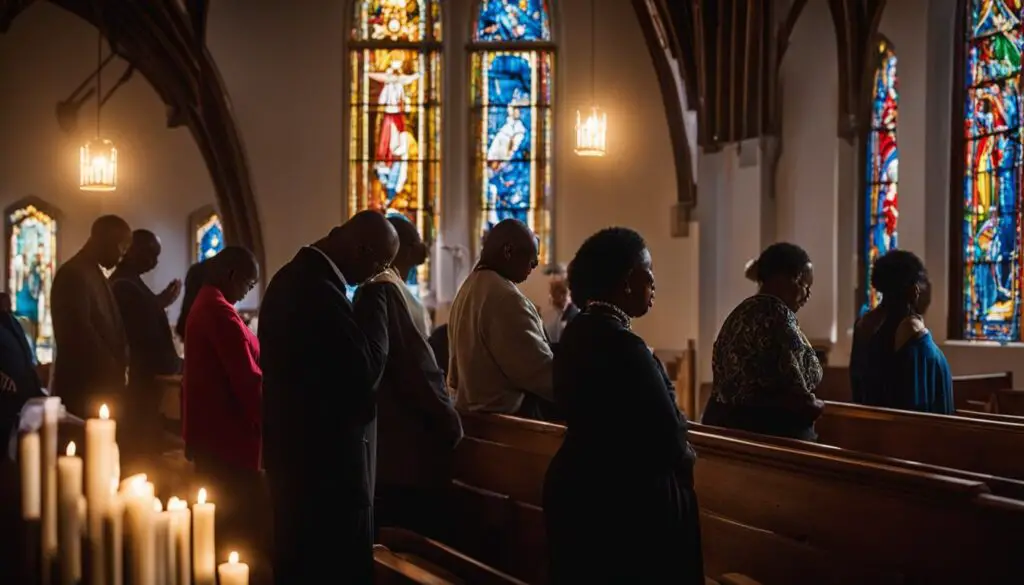
Blended Worship Practices
In some churches, a blended approach to worship practices is adopted, incorporating elements from both traditional and contemporary styles. These services strive to provide a balance, honoring the rich traditions of the past while embracing the dynamic expressions of the present. It brings together the timeless beauty of hymns with the vibrant energy of modern worship songs, creating a unique and inclusive worship experience.
Key Takeaways:
- Worship is a fundamental aspect of church leadership, fostering spiritual connection and growth within the congregation.
- Church leaders play a crucial role in curating meaningful worship experiences aligned with their congregation’s beliefs and traditions.
- Worship practices can vary across different denominations, ranging from traditional liturgy to contemporary expressions.
- Understanding different worship styles empowers church leaders to create worship experiences that resonate with their congregants.
Sacred Texts in Church Leadership
Sacred texts hold a central place in church leadership, providing guidance and inspiration for leaders and their followers. These holy scriptures are revered as sources of divine wisdom and essential teachings that shape the beliefs and practices of the church.
The sacred texts vary among different denominations and sects within Christianity, but they all share the common purpose of imparting spiritual truth and leading believers on their spiritual journeys. The Bible, which includes the Old and New Testaments, is the primary sacred text for most Christian denominations. It contains the teachings, stories, and historical accounts that form the foundation of Christian faith.
In addition to the Bible, other religious texts, such as the Book of Mormon for the Latter-day Saints or the Apocrypha for certain Catholic and Orthodox traditions, are considered sacred and authoritative within specific faith communities. These texts provide additional insights and teachings that complement the core doctrines found in the Bible.
“The scriptures are given not only for our guidance but also for our growth.” – Russell M. Nelson
Church leaders are responsible for interpreting and teaching the sacred texts, ensuring that their congregations understand and apply the principles and values contained within them. They study the scriptures diligently, seeking divine inspiration and guidance to provide meaningful biblical teachings that address the spiritual needs of their community.
When delivering sermons or leading Bible study sessions, church leaders often reference specific passages or stories from the sacred texts to illustrate important spiritual lessons or provide moral guidance. They rely on the wisdom contained within these scriptures to shepherd and nurture the faith of their congregations.
Key Takeaways
- Sacred texts, such as the Bible, hold a central place in church leadership.
- These texts provide guidance and inspiration for leaders and followers.
- Church leaders interpret and teach the sacred texts, applying their teachings to the spiritual needs of their community.
- Scriptures play a crucial role in sermons and Bible study sessions, illustrating important lessons and providing moral guidance.
The sacred texts not only inform the foundational beliefs and practices of the church but also serve as a source of comfort, hope, and wisdom for individuals seeking spiritual guidance. Their study and interpretation by church leaders contribute to the ongoing evolution of religious understanding and the development of leadership practices that align with the teachings of the faith.
Denominations and Sects in Church Leadership
The diversity of denominations and sects within Christianity has led to varied approaches to church leadership. Each denomination and sect has its own unique beliefs, practices, and organizational structures, shaping the way leadership is understood and executed within their respective communities.
Denominations
Denominations refer to different branches or groups within Christianity that share common beliefs and traditions. They may differ in aspects such as worship styles, liturgical practices, and interpretations of Scripture. Some well-known Christian denominations include:
- The Roman Catholic Church
- The Eastern Orthodox Church
- The Anglican Communion
- The Lutheran Church
- The Methodist Church
- The Baptist Church
Each denomination has its own hierarchy and leadership structure, with leaders such as bishops, priests, pastors, and deacons playing integral roles in guiding and ministering to their congregations.
Sects
Sects, on the other hand, are smaller groups within Christianity that often emerge as a result of theological disagreements or a desire for a more distinct identity. These sects may have their own interpretations of Scripture and unique practices that set them apart from mainstream denominations. Some examples of Christian sects include:
- The Amish
- The Jehovah’s Witnesses
- The Seventh-day Adventists
- The Pentecostal Movement
While denominations generally have a more established and recognized presence, sects often operate as more independent and tightly-knit communities, with leadership roles distributed amongst the members based on their own specific principles and traditions.
“In the diversity of denominations and sects, we find a tapestry of approaches to church leadership, each reflecting the unique journey and interpretation of faith. This rich mosaic of perspectives inspires us to explore and learn from one another as we seek to lead our congregations with wisdom and grace.” – Reverend Elizabeth Thompson
Leadership Styles and Practices
Denominations and sects often have distinct leadership styles and practices that are influenced by their doctrinal beliefs and historical contexts. These differences can be seen in areas such as decision-making processes, ordination requirements, and the involvement of laity in leadership roles.
Some denominations place a strong emphasis on hierarchical structures, with clear lines of authority and a formal process for selecting and ordaining leaders. Others prioritize a more democratic approach, where decisions are made collectively through consensus-building and congregational input.
In some sects, leadership may be more egalitarian, with a focus on shared responsibilities and communal decision-making. Others may adhere to more charismatic or visionary leadership models, where individuals with specific spiritual gifts are called to lead and guide the community.
It is important for church leaders to have a respectful and open-minded understanding of the diversity of leadership styles and practices across denominations and sects. By fostering dialogue and learning from one another, we can gain valuable insights and develop a more inclusive perspective on church leadership.
Community and Outreach in Church Leadership
Church leadership extends beyond the walls of the church, encompassing community engagement and outreach. Understanding the importance of community involvement and outreach can help church leaders effectively impact their surrounding communities. By actively engaging with the community, church leaders have the opportunity to demonstrate Christ’s love and compassion, inviting others to experience the transformative power of faith.
One of the key aspects of community involvement is identifying and addressing the needs of the local area. Church leaders can initiate and participate in various outreach programs to provide support and assistance to those in need. This could range from organizing food drives and clothing donations to offering educational programs and mentoring opportunities.
“As we serve others, we not only meet their immediate needs but also create an atmosphere where people can encounter God’s love and experience genuine transformation.”
By actively reaching out to the community, church leaders can foster stronger relationships and build trust among the people they serve. This allows for greater opportunities to share the Gospel and invite individuals to be part of the Church community.
In addition to physical outreach, church leaders can also engage with the online community through social media platforms and digital resources. This enables them to connect with a wider audience and share messages of hope and inspiration beyond the physical boundaries of the church.
The importance of community and outreach in church leadership cannot be overstated. By prioritizing the needs of the community and actively engaging in outreach efforts, church leaders can make a lasting impact on the lives of individuals and strengthen the overall mission and vision of the Church.
Key Benefits of Community and Outreach in Church Leadership:
- Building relationships and trust with the local community
- Addressing the needs of the community through outreach initiatives
- Sharing the love of Christ and inviting others to experience faith
- Connecting with a wider audience through online platforms
- Strengthening the overall mission and vision of the Church
Contemporary Issues and Challenges in Church Leadership
Church leadership is facing numerous challenges in today’s ever-changing world. Leaders must navigate through a landscape marked by social change, cultural shifts, and evolving religious dynamics. By addressing these challenges head-on, church leaders can guide their congregations towards a thriving future.
Social Change
The rapid pace of social change presents a significant challenge for church leaders. Societal norms and values are constantly evolving, requiring leaders to adapt their approaches to remain relevant. Embracing diversity, inclusivity, and social justice are crucial in fostering a compassionate and inclusive community.
Cultural Shifts
Churches are operating in an increasingly multicultural and diverse society. Church leaders must understand and respect the varying cultural backgrounds and perspectives within their congregations. Building bridges across cultures and embracing diversity can promote unity and foster a sense of belonging.
Evolving Religious Landscapes
The religious landscape is continually evolving, with changes in religious affiliation and declining church attendance. Church leaders must engage with these shifts and find innovative ways to connect with individuals seeking spiritual fulfillment. Adapting outreach strategies and embracing new technologies can help bridge the gap between the church and the broader community.
“The challenges faced by church leaders in today’s world require adaptability, resilience, and a deep understanding of the needs and aspirations of their congregations.”
By addressing these contemporary issues, church leaders can navigate the complexities of modern leadership and fulfill their calling. It is through proactive engagement and thoughtful responses that churches can continue to make a positive impact on their communities.
| Issue | Impact | Leadership Strategies |
|---|---|---|
| Social Change | Can lead to conflicts between traditional values and societal trends | Embrace inclusivity, engage in community dialogues, adapt worship practices |
| Cultural Shifts | Requires sensitivity towards diverse cultural backgrounds and perspectives | Provide support for immigrant communities, embrace multilingual services |
| Evolving Religious Landscapes | Declining church attendance and changes in religious preferences | Explore innovative outreach methods, leverage social media, host community events |
Conclusion
Effective church leadership requires a combination of qualifications and competencies. By cultivating the essential qualities discussed in this Church Leadership Guide, church leaders can inspire and guide their congregations, fostering spiritual growth and community engagement.
Throughout history, church leaders have played a crucial role in shaping religious communities. From the early days of the Church to the present, leaders have drawn from a rich heritage of beliefs, doctrines, and sacred texts to guide their actions and decisions.
Sacraments and rituals have served as cornerstones of church leadership, providing opportunities for spiritual connection and transformation. These sacred practices, whether through baptism or communion, create moments of profound significance, reinforcing the bonds between leaders and their congregations.
Leadership and clergy roles within the church carry great responsibility. Church leaders must navigate diverse denominations, sects, and worship practices, delivering messages of hope, love, and inclusion. Additionally, church leaders are called to engage with their communities and reach outwards, promoting social justice and compassion.
In the face of contemporary challenges, church leaders must adapt their leadership approach. They must address issues related to social change, cultural shifts, and the evolving religious landscape. By staying knowledgeable and responsive to these challenges, leaders can provide guidance and support, ensuring the Church remains relevant and vibrant in the modern world.
FAQ
What qualifications are necessary for church leadership?
Church leaders should possess a strong foundation in their faith, demonstrate character traits such as integrity and humility, have a deep understanding of biblical teachings, and exhibit strong interpersonal skills.
What are the essential competencies for effective church leadership?
Effective church leaders should have the ability to communicate effectively, lead with vision and purpose, provide pastoral care and guidance, build and nurture relationships, and navigate complex organizational dynamics.
How has church leadership evolved over time?
Church leadership has evolved from its origins in biblical teachings and early church practices to adapt to changing societal and cultural contexts. It has also been influenced by various denominations and sects within Christianity.
How do beliefs and doctrines impact church leadership?
Beliefs and doctrines shape the values and principles that guide church leadership. Church leaders align their practices with these core beliefs to ensure the spiritual well-being and growth of their congregation.
What role do sacraments and rituals play in church leadership?
Sacraments and rituals provide opportunities for spiritual guidance and growth within the congregation. Church leaders incorporate these practices to foster a deeper connection with God and promote the spiritual development of their followers.
What are the different roles and responsibilities of church leaders?
Church leaders fulfill various roles, including clergy members who hold positions of authority within the church. They are responsible for providing spiritual guidance, preaching, teaching, administering sacraments, and overseeing the overall operations of the church.
How can church leaders create meaningful worship experiences?
Church leaders can create meaningful worship experiences by understanding different worship practices and their significance, incorporating diverse forms of worship, and creating an environment that fosters spiritual connection and growth within the congregation.
What is the significance of sacred texts in church leadership?
Sacred texts, such as the Bible, hold a central place in church leadership by providing guidance and inspiration for leaders and their followers. Church leaders study and interpret these texts to inform their teaching and decision-making processes.
How do denominations and sects influence church leadership?
The diversity of denominations and sects within Christianity has led to varied approaches to church leadership. These differences impact leadership styles, practices, and the specific roles assigned to leaders within their respective denominational traditions.
Why is community engagement and outreach important in church leadership?
Church leaders recognize the importance of engaging with the community beyond the church walls. Community involvement and outreach allow leaders to impact and serve their surrounding communities, demonstrating their faith in action and effectively fulfilling their mandate of spreading the gospel.
What challenges do church leaders face in the modern world?
Church leaders face challenges related to social change, cultural shifts, and evolving religious landscapes. They must navigate these complexities while ensuring their leadership remains relevant, engaging, and capable of addressing the spiritual and practical needs of their congregation.











